Institute for Contemporary Education confirms itself as a leader in education for the future: April marked by international projects in the field of modern practices
The Project Center of the Institute for Contemporary Education consistently implemented new projects in April that combine different aspects of modern education, thus making a step forward toward establishing modern practices in the domain of contemporary education.
ICE can boast a large number of submitted project applications in the February-March 2022 submission period, thus continuing its successful project tradition.
ICE implemented an impressive number of international and regional projects in April, organized educational teacher seminars, and established new international cooperations within the Erasmus+ program dedicated to the latest educational trends, application of educational technologies, issues related to digital education, and incorporation of unconventional approaches in our educational practice.
The Project Center had several goals this year:
- to make LEA institutions and schools as independent as possible in the process of developing project ideas, preparing project proposals, and finding partners;
- to focus its own efforts on the preparation of project proposals for its umbrella institutions - LINKgroup and ICE;
- to expand the list of reliable partners for projects and partnerships;
The impressive number of submitted project proposals best illustrates our efforts to achieve the defined goals: 7 projects for LINKgroup and 5 for ICE.
In this way, LINKgroup and ICE, in addition to adopting the latest knowledge in the field of education for the future and implementing it in practice, actively participate in the effort to shape a new European and global educational scene.
Deadline for Erasmus KA1 and KA2 2022 projects expires
As in previous years, the Project Center of the Institute for Contemporary Education can boast a large number of project applications that arrived during the February/March 2022 submission period.
Topics covered by applications in school education include: STEM and circular economy, game-based learning solutions, promotional of environmentally responsible behavior, student entrepreneurial competencies, learning about biodiversity through environmental action, prevention of cognitive overload in education, teaching gifted students, dangers of online shopping, kinesthetic learning and STEM, observing natural disasters, learning about prejudices and stereotypes.
Project applications in the field of higher education covered the following topics: emotional engagement of students in the online environment, higher education institutions with entrepreneurial orientation, networking and knowledge transfer, capacity of art to help communities and individuals overcome modern day problems, networking of culture and education and the ICT sector: augmented reality, VR, cultural heritage and collaborative creativity, economic footprint of the sector of culture and creativity, employment and starting one's own business in CCI.
We are very proud that ITHS and our gymnasiums have completely independently prepared a total of 9 project proposals for this submission period (5 by Savremena gimnazija, 3 by International School, and 1 by ITHS).
We tried to act as the best mentors to Primary School Savremena that submitted 3 project proposals in this period, whereas the Faculty of Contemporary Arts independently prepared one project, and two were developed in partnership with the Project Center.
As announced, the results of the work invested in the development of these 26 project proposals will be known during summer. We believe and hope that in the fall, we will be able to bring good news regarding new projects that have received funding, and include some of you in project teams.
We thank all our colleagues who diligently worked, learned, created, networked, and contributed to the development of education in our country and other European countries with their creative ideas.
Behave Your Prints: Responsible and beneficial use of technology
The Institute for Contemporary Education has received support from the European Commission to implement the Behave your prints project within the Capacity Building in the Field of Youth program. As a leading partner, and with the help of 5 European organizations: EUTA from The Czech Republic, Smart Idea from Slovenia, Beyond Barriers from Albania, Mensa from Montenegro, and Edukopro from Bosnia & Herzegovina, the Institute will be implementing project activities during 2022 and 2023. The first meeting of the project management team will be held on May 30 and 31 in Belgrade, to determine the procedures, tools and timeframes for the most efficient organization of the project activities aimed at producing innovative methodology, and an instruction handbook.
What is the level of awareness of today's teenagers about the importance of one's digital footprint?
Modern teenagers use various digital tools to record their lives on the Internet, without being aware how important one's digital footprint and digital reputation are for their future career and professional reputation. This project aims to support young people (aged 14 to 18) to become active citizens in the digital society by behaving responsibly and appropriately online so as to protect their online reputation for the sake of their professional and social future. In the course of the project, experts in the field of youth online education will create an innovative methodology as well as an instruction handbook to help all those involved in youth education to raise their awareness of the importance of responsible online behavior in a creative and engaging way.
The whole project team is looking forward to the beginning of project implementation, and meeting in Belgrade!
Care2Learn – the first Erasmus project of Primary School Savremena for children and parents successfully launched!
The first meeting of project partners, including representatives of Primary School Savremena, was held in Zagreb, with immense enthusiasm and love for children! We coordinated our attitudes regarding project-related issues, and spent time in constructive discussion.
We are motivated to find new ways to help children and parents begin a new chapter of their lives prepared, and open the door to education!
This cooperation is realized through the Erasmus+ program with partners from Croatia and Cyprus. The main goal of the Care2Learn project, coordinated by the Step by Step parents' association is to help preschool children and their parents develop skills that will prepare them for the next step – starting primary school, through gamification and joint activities.
One of the planned outcomes of the project is a mobile app that provides parents with advice on the activities they should practice with their children to develop the necessary competencies. Sounds useful, right? Join us and give us your expert opinion as a parent or a teacher, so that we could create a school readiness test together, and a preparatory mobile app.
The first CARE2LEARN project meeting was held in Zagreb on December 19–21, 2021, and three members of the project team attended an international meeting that marked the beginning of the project.
SpeakER Project – teaching material
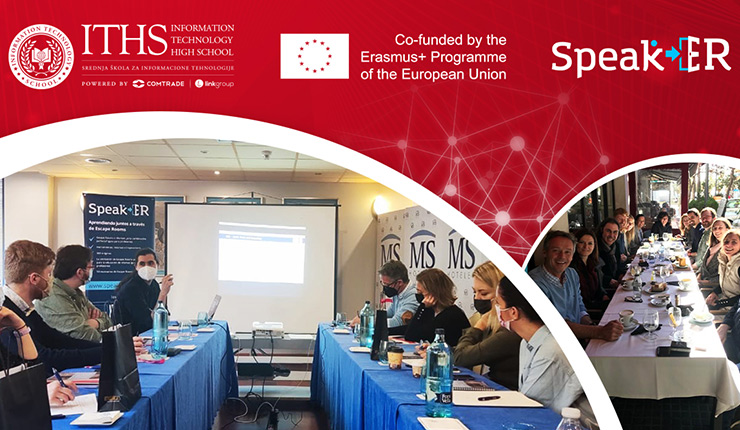
The multinational SpeakER project brought together partners from Belgium, France, Spain, Romania and Greece in the Spanish town of Malaga in late January. This was a unique opportunity for partner organizations working on this project to finally meet face-to-face, review what's been done so far, and define the next steps. The Babel School of Languages proved to be a wonderful host during our one-week stay in Malaga.
In the pleasant Spanish climate and friendly multicultural surroundings, our time in Malaga was spent in constructive meetings that discussed everything that has been done so far in the preparation of the project, as well as further steps. You can read more about it here.
The SpeakER project implemented by ITHS, and funded by the French National Agency aims to encourage multilingualism and soft skills through Escape Rooms language courses. These games involve scenarios that will help students develop the skills of reading, writing, listening and speaking, as well as their mastery of foreign languages by solving language puzzles, decoding written and audio messages, communicating in the target language, and exploring the environment filled with challenges and clues to "escape" the room.
We present the results of the SpeakER project.
You can download resources for English language teaching (problem solving and Escape Rooms) here. They include:
- Booklet ER and Languages: A Perfect Match?;
- Creation box;
- Collection of 300 enigmas: types and examples;
- Guide Animation of a Pedagogical ER for Language Education;
- 50 scripts;
- Resources in Serbian can be viewed here.
The art of De-Biasing
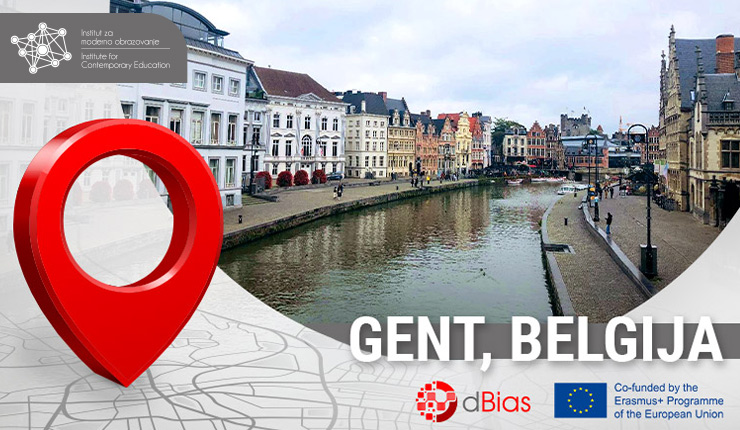
We have already entered the second year of the implementation of this ambitious project, which aims to improve teacher-student communication by raising awareness of cognitive biases we all have, and which hinder mutual understanding.
Expert teams of the Institute for Contemporary Education and our European partners prepared scenarios for video materials that depict real-life situations with identified biases. Scenarios are designed to showcase potential outcomes of such situations which can often be very conflicting and lead to negative consequences. We hope that we will soon be able to invite you to "test" your susceptibility to bias, and the plan of steps that will lead us there will be agreed at the upcoming meeting of the project team in Sofia, which is something we are looking forward to very much!
Learn more about the previous dBias meeting in the Belgian town of Ghent.
ICE presents to you an interesting infographic that was conceived during "dBias" project, designed to represent bias using simple concepts, comprehensible examples and interesting charts.
Take a look at the project website here.
ITHS teachers visited the Technical School Šiška in Ljubljana as part of MIR project
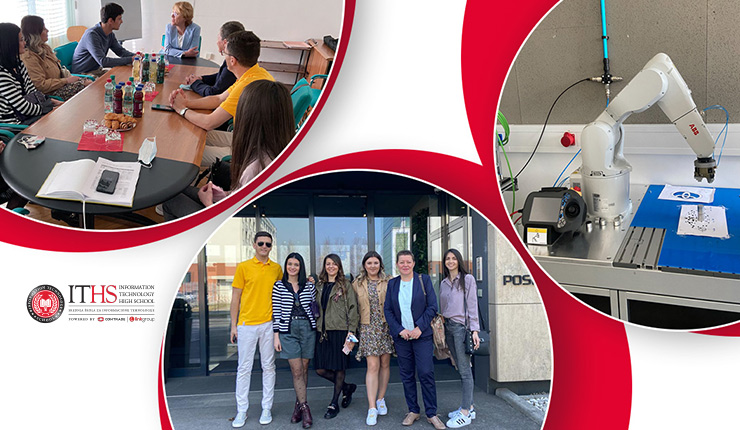
ITHS teachers visited the Technical School Šiška in Ljubljana, as part of the Erasmus+ project MIR, funded by the Serbian National Agency Tempus.
It was job shadowing, aimed at national and international networking with other educational institutions, as well as forming connections with the business sector so as to provide additional opportunities for our students after graduation.
The future of modern education lies in robotics, so the cooperation with our partners from Slovenia will bring new knowledge and opportunities to develop this field in ITHS programs, first as school clubs, and then as an educational profile.
During their visit to the Technical School Šiška in Ljubljana within the Erasmus+ project MIR, our teachers had the opportunity to follow the implementation of practical classes and exercises in the field of mechatronics.
After that, they visited the CPI (Center for Professional Development of Teachers in Slovenia) to learn more about their education system and ways of providing support to teachers, so that they could present these new methods to their colleagues at ITHS. Our lecturers also visited the Department of Robotics at the Ljubljana Faculty of Electrical Engineering.
You can learn more about this visit here.
Digital Socrates
Digital Socrates is an online workshop organized by the project team of the Institute for Contemporary Education on March 24 for the purpose of familiarizing high school teachers with modern teaching tools for civic education. More than 60 teachers of civic education, sociology, philosophy and history from all parts of Serbia had the opportunity to learn more about the digital handbook for modern civic education created by the ICE team within the Trial of Socrates in the 21st century project.
In a relaxed atmosphere, students and teachers analyzed modern digital tools, teaching materials and projects that involve processes of democratic youth decision-making through dynamic discussions.
The handbook was created as part of the project Educating future voters on decision-making processes in democratic societies through civic education: The Trial of Socrates, implemented by the Institute for Contemporary Education in partnership with the Embassy of the United States of America since October 2021. This didactic toolkit includes projects and additional digital resources, and aims to help students improve their competencies through problem solving and critical thinking, and become independent in terms of their participation in democratic society and decision-making processes.
Access the handbook here
Serbian teachers participate in the international Science on Stage festival in Prague for the first time
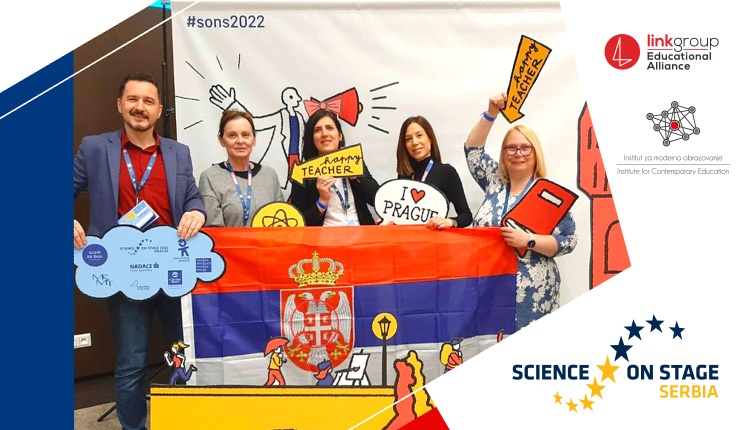
Science on Stage Europe organizes the largest European educational festival for STEAM teachers biannually. The event is always hosted by a different country. This year, the 12th edition of the festival was held between March 24 and March 27 in Prague, The Czech Republic. The festival brought together more than 350 STEAM teachers from all over Europe to share ideas and concepts for successful science education in primary and secondary school.
This international festival was preceded by the First National Festival Science on Stage, held on September 18, 2021, at Primary School Savremena in Belgrade, and organized by the Institute for Contemporary Education with the support of the LINKgroup educational cluster.
LINKgroup also sponsored travel expenses of the first Serbian national team of STEAM teachers.
Read more about the performance of the Serbian teachers' delegation here.
Sharing, travel, workshops
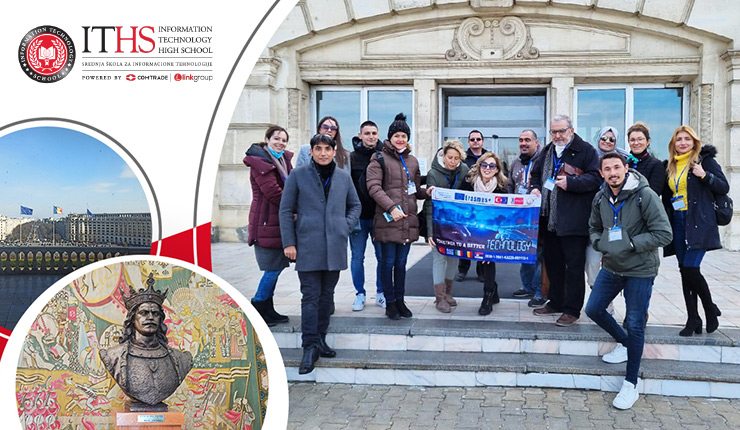
The Information Technology High School continues to participate in international projects integrated into the Erasmus+ platform. As part of the project Together to a Better Technology, teachers of our school visited Romania as guests of the LPS Brăila high school. Our team and their international partners developed a number of strategies and models aimed at safe Internet use, which will be implemented into the curriculum.
Learn more about the results of the projects and watch the project video.


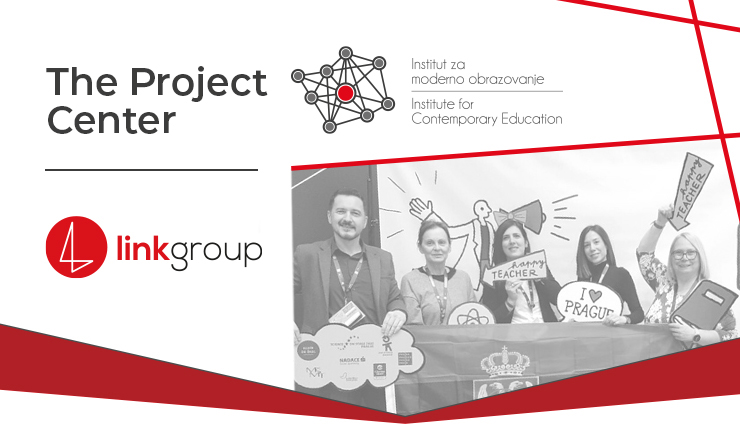
Leave a comment